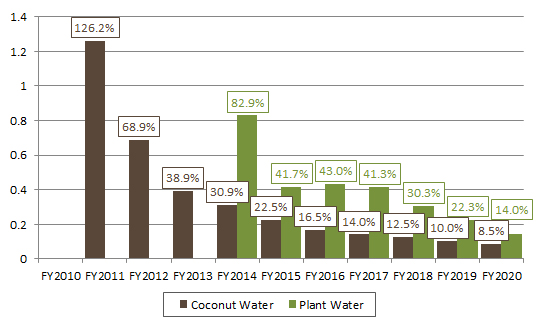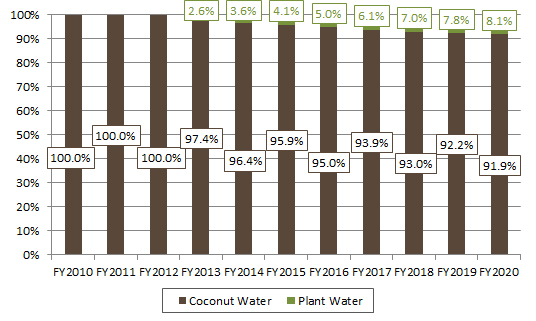The infographics below are derived from data contained in
BMC's DrinkTell™ Database with Market Forecasts
 |
 |
COCONUT WATER vs. PLANT WATERS:
The Race to the Treetops |
Although coconut water and (other) plant waters have been around for a while, the combined category has only begun to register in the past five or so years, according to Beverage Marketing's DrinkTell™ database. (For brevity, we refer to "plant water" as separate from coconut water even though the latter is technically "water from a plant", too.) Coconut water is liquid from the inside of a coconut (as opposed to coconut milk, which is reconstituted from the coconut "meat"), while plant waters are derived from trees (i.e., maple water and birch water) and plants (i.e., aloe vera and cactus).
DrinkTell™ began tracking plant water several years ago and thus the growth of that segment has exceeded that of coconut water recently due to its much lower base. Nonetheless, the more mature coconut water segment has enjoyed double-digit growth in the past five years (inclusive of 2016), after growing by triple digits in some years before that. While growth rates of coconut and plant water are expected to decelerate to 2020, this is a function of their increasing size. To illustrate, by 2020, the combined category is still expected to enjoy healthy annual growth of 8.85%. |
Plant Water Market To Grow Faster Than Coconut Waters
Coconut Water vs. Other Plant Waters
Volume YOY Growth Rates
FY2010-FY2020(P)
 |
Plant water is expected to steal share from coconut water in the coming years, according to DrinkTell™. On the other hand, by 2020, coconut water should still comprise more than 91% of the combined coconut and plant water volume.
The principal drivers of coconut and plant water growth are perceived naturalness, simple ingredients, inherent mineral and vitamin content and low naturally-occurring sugar content. Coconut water, in particular, has enjoyed growth in part to its natural electrolytes - which mimics that of sports drinks - although in recent years, marketers have tended to promote their wares as healthy lifestyle choices instead of as sports drink replacements. Plant waters are a bit more arcane at this point, but brand owners are attempting to use some of the same nutritional cues - e.g., manganese content of maple water - as coconut waters. Some are even touting their superiority to coconut waters, such as lower sugar content, broader nutritional bona fides and milder taste profiles. It all adds up to an exciting future for these once-exotic hydrators. |
Plant Waters Steal Market Share, But Coconut Water Dominance Continues
Coconut Water vs. Other Plant Waters
Volume Share
FY2010-FY2020(P)
 |
|
|

